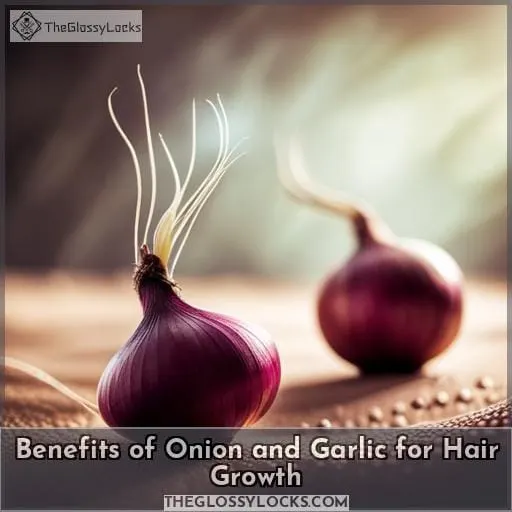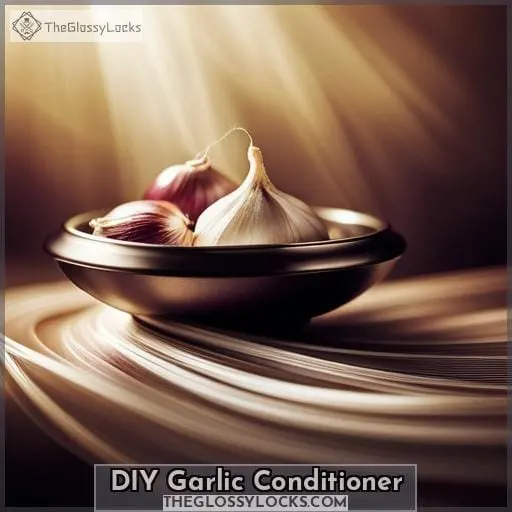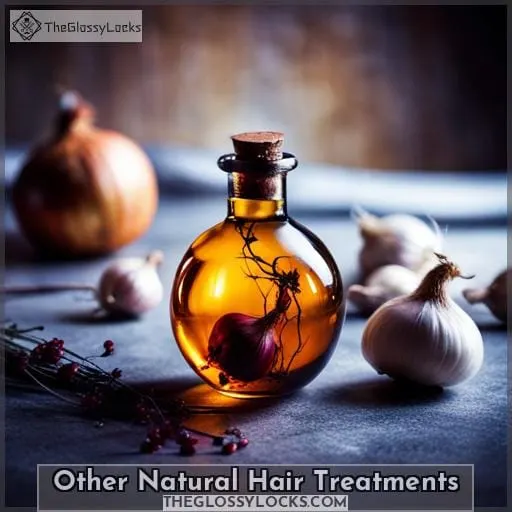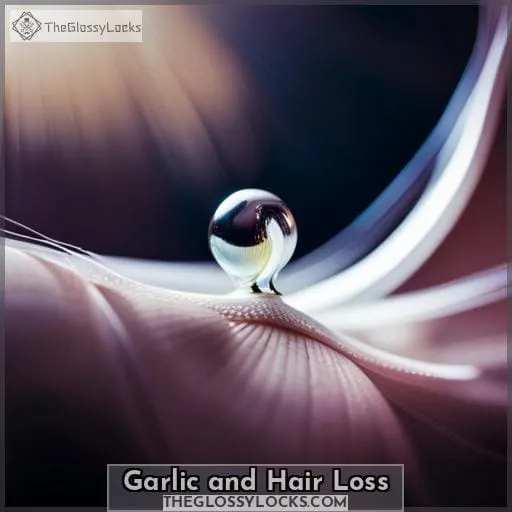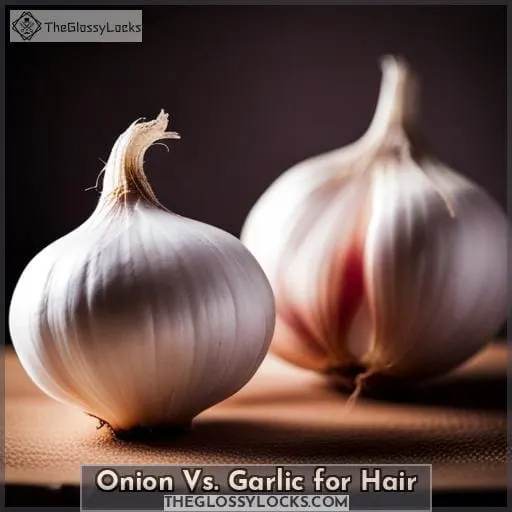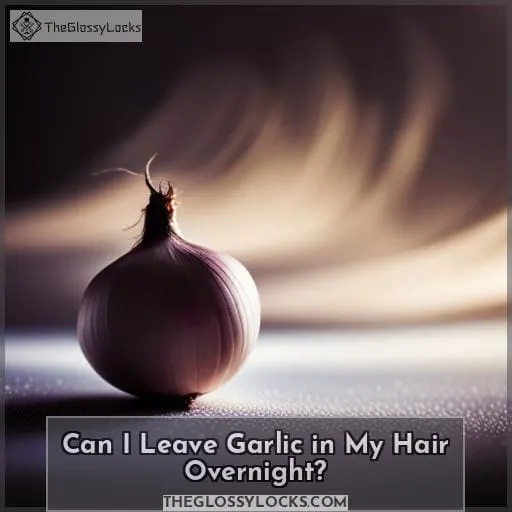This site is supported by our readers. We may earn a commission, at no cost to you, if you purchase through links.
 Worried onion and garlic oil will leave lingering scents in your hair? Don’t dismiss these ingredients yet. Sulfur compounds in them may actually treat thinning hair, making the temporary smell worth exploring.
Worried onion and garlic oil will leave lingering scents in your hair? Don’t dismiss these ingredients yet. Sulfur compounds in them may actually treat thinning hair, making the temporary smell worth exploring.
Use a weekly scalp massage to stimulate hair follicles, taking care to avoid burns. Though still being researched, these kitchen staples could thicken your locks naturally.
Table Of Contents
- Key Takeaways
- Benefits of Onion and Garlic for Hair Growth
- DIY Garlic Conditioner
- Safety Considerations
- Other Natural Hair Treatments
- Garlic and Hair Loss
- Onion Vs. Garlic for Hair
- Can I Leave Garlic in My Hair Overnight?
- Frequently Asked Questions (FAQs)
- How often should I use onion and garlic oil treatments for optimal hair growth?
- What ratio of onion to garlic should I use when making my own hair oil?
- Can I use onion and garlic oil if I have color-treated or chemically processed hair?
- Will applying onion and garlic oil lighten my natural hair color over time?
- Is it safe to use onion and garlic oil treatments during pregnancy and breastfeeding?
- Conclusion
Key Takeaways
- Onion and garlic contain sulfur compounds and nutrients that may strengthen hair and stimulate growth when applied topically.
- Garlic oil or onion oil hair treatments show potential for combatting hair loss, but evidence is limited and inconclusive.
- Always exercise caution with garlic or onion oils – conduct skin tests first, watch for burns/irritation, and consult doctors before relying on them.
- While garlic and onion hair remedies may hold promise, manage expectations and see a dermatologist for proven baldness treatments.
Benefits of Onion and Garlic for Hair Growth
You’ll be glad to know that onion and garlic offer various potential benefits for hair growth. Their rich nutritional content, antimicrobial properties, possible UV protection, and early research showing hair growth effects make them promising natural remedies.
Now let’s explore the specifics of how onion and garlic may combat thinning hair.
Nutritional Content
With their high sulfur content and abundance of vitamins and minerals, onion and garlic can nourish your hair from root to tip. As versatile culinary ingredients, they offer dietary benefits through consumption.
Garlic-infused treatments may also directly condition hair when applied topically.
Consider coconut oil, biotin, and other natural alternatives alongside onion garlic oil for holistic hair growth.
Antimicrobial and Antifungal Properties
Secondly, onion and garlic’s antifungal and antimicrobial properties strengthen hair follicles by combating bacteria and infections on your scalp.
- They balance the scalp microbiome, preventing overgrowth of fungus and bacteria.
- Used for centuries in herbal haircare remedies and DIY hair masks.
- Key ayurvedic ingredients valued for aromatherapy benefits.
Potential UV Protection
You’ll also find preliminary research showing how onion and garlic may shield your skin cells from UV damage, thus potentially reducing aging effects on your hair. While more evidence is still needed, some view onion and garlic as sunscreen alternatives containing natural UV filters.
When appropriately formulated and applied, they may aid as DIY options offering defense against sun exposure’s impact on hair health and appearance.
Potential Hair Growth Effects
Through preliminary research, onion and garlic oils show promise for stimulating hair growth, though more evidence is still needed to conclusively determine efficacy.
When applied topically or consumed, garlic and onion may improve nutrient absorption, sulfur sensitivity, and scalp health to aid struggling follicles.
However, consult a dermatologist before relying solely on these ingredients as baldness cures.
DIY Garlic Conditioner
To create your own garlic-infused conditioner at home, you’ll need to gather some simple ingredients and tools – namely fresh garlic cloves, a carrier oil like olive or coconut, and a few kitchen implements.
Next, you’ll combine the garlic and oil using basic preparation steps before straining and storing the finished oil.
Finally, detailed instructions are provided for properly massaging the DIY conditioner into your scalp and washing it out afterwards.
Ingredients and Tools Needed
You’ll need eight cloves of fresh garlic, 16 tablespoons of carrier oil, a fork, garlic press or blender, small pan, and strainer to make the DIY conditioner.
Crush garlic cloves and gently warm oil to infuse active compounds into the nutrient-rich elixir without cooking it.
Let the garlic infused oil cool before straining to create a topical hair care treatment.
Take precautions like conducting a skin patch test first to avoid potential chemical burns from leaving the garlic conditioner in hair overnight.
Preparation Steps
First, crush 8 fresh garlic cloves and add them plus 16 tablespoons of carrier oil to a small pan.
- Warm over low heat until fragrant
- Remove from heat and let cool
- Strain out garlic pieces
- Store infused oil in a glass container
Massage 2 tablespoons of the oil into your scalp and wait 10-15 minutes before washing out. Using this garlic oil can provide long-term benefits for hair health when applied properly and safely.
Application Instructions
After preparing the garlic oil mixture, massage two tablespoons of it into your scalp and let it sit for 10-15 minutes before washing out with a mild shampoo. This allows the oil to penetrate the scalp without risking irritation from leaving it on too long.
To enhance effectiveness, try these tips:
| Technique | Reason |
|---|---|
| Overnight application | Allows more absorption time |
| Add essential oils | Helps neutralize garlic odor |
| Scalp massage | Boosts circulation for better delivery |
| Ingest garlic | Provides internal nourishment |
| Review tutorial | Learn proper application methods |
Safety Considerations
When using onion and garlic oils, exercise caution.
Always do a skin patch test before wider application.
Be mindful of potential irritation from sulfur compounds or risk of burns from overapplication.
Consult a doctor, especially if pregnant or nursing.
Skin Patch Test
Before applying any garlic-infused product to your scalp, conduct a skin patch test on a small area to check for potential irritation.
Given garlic’s potency, those with sensitive skin must check for signs of inflammation or discomfort by dabbing a small amount on the arm and waiting 24 hours.
Monitoring for adverse reactions like rash, burning, or itching provides insight on tolerability and appropriateness for patch testing prior to full application.
When uncertainty exists regarding skin sensitivity or potential allergic reactions, consultation with a dermatologist proves most prudent.
Possible Side Effects
Two possible side effects you’ll want to keep in mind when using onion and garlic oils are rashes or skin irritation.
To ensure a safe experience, here are some sensitivity precautions to follow:
- Perform a patch test before applying the oil to your scalp.
- Discontinue use if you experience any adverse reactions.
- Avoid prolonged application of the oil on your skin or hair.
- Consult with a dermatologist for personalized advice and guidance on alternative hair treatments.
Sulfur Compounds and Irritation
Certain sulfur compounds in onion and garlic oils can cause skin and eye irritation for some, necessitating caution when using them topically.
Individuals with sensitive skin or sulfur allergies may experience adverse reactions like rashes.
While leaving the oils on overnight does allow more time for potential benefits, this also heightens irritation risks.
Monitoring for reactions and discontinuing use if they occur is advisable, as is testing aroma tolerance, since some find the lingering smell unappealing.
Taking precautions allows maximizing potential gains while minimizing discomfort.
Chemical Burns
By leaving garlic or onion oil on your scalp for extended periods, you’re risking chemical burns from the sulfur compounds.
- Avoid overnight application.
- Rinse out after 30 minutes maximum.
- Test on a small area first.
- Dilute in carrier oils if sensitive.
Leaving onion or garlic oil on too long can cause severe burns. Be cautious, do test patches before wider application, and limit contact to 30 minutes or less.
Consultation With a Doctor
Prior to trying garlic-based treatments, especially during pregnancy or breastfeeding, consulting a doctor provides guidance on using natural remedies safely.
With limited evidence on garlic’s efficacy and safety for hair, a doctor’s advice enables personalized assessment of risks versus potential benefits when exploring alternative approaches.
Their medical knowledge facilitates well-informed decisions regarding treatment plans inclusive of natural options like garlic.
Other Natural Hair Treatments
You can also reduce hair damage from over-washing, heat styling, and excessive product use.
Limit washes to 1-2 times per week.
Minimize blow drying and heat tools.
Use protective sprays beforehand when heat is unavoidable.
Cut back on heavy styling creams or gels.
A healthy, balanced diet with key hair nutrients like vitamins A through E, iron, zinc, and proteins aids overall hair vitality.
Reduce Hair Damage
You can also reduce hair damage by washing it less frequently and air-drying instead of using a blow dryer.
Limiting shampooing preserves the scalp’s natural oils, while air-drying prevents heat exposure.
Explore hair care approaches focused on scalp health, like Ayurvedic oil massages.
Further protect hair by using heat protectants and gentle handling.
Limit Heat Styling
When heat-styling your locks, be sure to use protectant sprays beforehand so you don’t further damage already thinning hair.
- Experiment with heat-free styling methods like braids, buns, or bandanas.
- Try protective styles like silk wraps or satin bonnets while sleeping.
- Massage the scalp to increase blood flow and nourish hair follicles.
- Incorporate nutrient-rich foods like avocados, nuts, and fatty fish.
Use Fewer Styling Products
The use of fewer styling products promotes overall hair health.
Limiting gels, mousses, sprays, and other frequently-used stylers reduces damage from chemicals and over-manipulation.
When heat tools are needed, always prep with a protectant.
Ultimately, embracing hair’s natural texture requires fewer products. By avoiding over-reliance on stylers, you enable hair to reach its healthiest natural state.
Consider Alternative Treatments and a Balanced Diet
Pursuit of further treatment options like coconut oil, avocado oil, biotin supplements, and a nutrition-focused diet continues your journey toward optimal hair health.
Incorporating alternative remedies through holistic approaches like essential oils as well as thoughtful lifestyle choices support healthy hair.
However, scientific insights on efficacy remain limited, underscoring the importance of an overall balanced diet.
Garlic and Hair Loss
While garlic may promote hair growth, research currently lacks consistent evidence confirming it as a cure for baldness.
As an alternative alopecia areata treatment, topical garlic has been explored but requires further study for validation.
Before considering garlic-based treatments, consulting a dermatologist is crucial for appropriate guidance.
Lack of Consistent Evidence
While treatments like coconut oil may promote hair health, garlic lacks consistent proof as a cure-all for baldness or substantial thinning. You’re better off consulting a dermatologist before trying garlic oil or juice treatments on their own.
Despite lingering myths, garlic requires alternative approaches and further scientific scrutiny based on user experiences and expert opinions.
Exploration as Alternative Treatment for Alopecia Areata
You’ve pursued garlic as an alternative alopecia areata treatment, but more research is still needed before considering garlic-based approaches.
- Early studies show some promise.
- Combining with other ingredients may help.
- Consult a dermatologist for guidance.
Importance of Dermatologist Consultation
Although garlic shows early promise for treating hair loss, you’d be wise to consult a dermatologist before considering garlic-based treatments.
With specialized knowledge on effective and safe application, a dermatologist can guide you in:
- Exploring garlic alongside other remedies
- Assessing root causes
- Determining an integrated treatment plan for your hair loss.
Their insight fuels wise decisions regarding appropriate usage and safety measures for optimal results.
Onion Vs. Garlic for Hair
Like garlic, onion boasts similar antioxidant, anti-inflammatory, and antimicrobial traits that may promote hair growth. However, both onion and garlic carry risks of burns resulting from their high sulfur content, necessitating careful application.
Research on onion for hair health shows early promise but remains inconclusive, warranting consultation with a dermatologist for guidance on natural remedies like onion or garlic oils.
Similar Properties and Potential Hair Growth Effects
Both onion and garlic share similar antimicrobial and anti-inflammatory traits that may stimulate hair follicles, but the extent of their effectiveness demands further study before you’d incorporate them into your hair loss regimen.
Onion and garlic contain sulfur compounds, antioxidants, and nutrients that may promote hair health.
Both can be used to create DIY hair treatments like infused oils and masks.
Exercise caution with topical use due to potential skin irritation.
Consider dietary inclusion, alternative natural remedies, and consulting a dermatologist.
Risk of Burns
The risk of chemical burns from leaving onion or garlic on your scalp or hair for too long necessitates caution when using them.
| Treatment | Onion | Garlic |
|---|---|---|
| Sulfur Content | High | High |
| Burn Risk | High | High |
| Overnight Use | Not advised | Not advised |
| Safety Measures | Patch test, limited leave-in time | Patch test, limited leave-in time |
| Sulfur Sensitivity | Can irritate skin and eyes | Can irritate skin and eyes |
When creating DIY haircare with these natural alternatives, be mindful of potential irritation.
Ongoing Research on Onion’s Effects
You’re likely aware research on how onion impacts hair is still unfolding.
- Nutrient-rich onions may stimulate hair follicles.
- Onion juices and oils could nourish hair when applied topically.
- Onions may increase collagen production which benefits hair.
- More research is needed to confirm onion’s effects on various hair conditions.
- Consult a trichologist or dermatologist for guidance on using onions for hair.
Dermatologist Consultation for Guidance
You’ll often need to consult a dermatologist for guidance when using onion or garlic for hair.
A dermatologist can provide insights on using natural remedies for thinning hair and advise on incorporating onion or garlic into your hair care routine in a safe, effective way. They can assess your scalp health, diagnose potential underlying issues, and offer guidance tailored to your specific needs.
| Treatment | Onion | Garlic |
|---|---|---|
| Antimicrobial properties | Yes | Yes |
| Anti-inflammatory effects | Yes | Yes |
| Evidence for hair growth | Limited | Limited |
| Risk of skin irritation | High | High |
| Guidance needed | Yes | Yes |
Can I Leave Garlic in My Hair Overnight?
Though onion and garlic oils show promise for treating hair loss, leaving garlic in your hair overnight carries risks of skin irritation or even chemical burns if you don’t take proper precautions.
Test a small patch first and don’t exceed 30 minutes for initial applications. Gradually increase contact time while monitoring for adverse effects.
Though extended overnight application may boost long-term results, balance potential odor and irritation risks first. Seek guidance on effective application times from a trichologist or dermatologist.
Start with brief 5-10 minute exposures before leaving garlic on hair overnight to allow your scalp to adjust and avoid burns.
With careful precautions, extended garlic application may aid hair regrowth over time through improved circulation, nourishment and antimicrobial protection.
Frequently Asked Questions (FAQs)
How often should I use onion and garlic oil treatments for optimal hair growth?
Apply the onion and garlic oil treatment to your scalp once or twice per week for best results.
Massage the oil in thoroughly and let it soak for at least 30 minutes before washing out.
Be consistent with the treatments for optimal hair growth over time.
What ratio of onion to garlic should I use when making my own hair oil?
I would recommend using a 2:1 ratio of onion juice to garlic juice when making your own hair growth oil. This provides an optimal balance of the beneficial properties in both ingredients.
Experiment to find the right ratio for your hair needs.
Can I use onion and garlic oil if I have color-treated or chemically processed hair?
Yes, you can use onion and garlic oil on color-treated or chemically processed hair.
Follow your stylist’s post-coloring instructions, perform a skin patch test before wider application, and discontinue use if irritation occurs.
Limit leave-on time to minimize potential damage to already compromised hair.
Will applying onion and garlic oil lighten my natural hair color over time?
Onion and garlic oils shouldn’t lighten natural hair color with regular use.
However, leaving the oils on too long or applying excessively could potentially lead to slight lightening over an extended period.
Moderation is key for maintaining color integrity.
Is it safe to use onion and garlic oil treatments during pregnancy and breastfeeding?
Consult your doctor before using onion or garlic oil treatments during pregnancy or breastfeeding. Their safety hasn’t been established, and they may cause unintended effects. Focus on gentle, proven methods for hair care.
Conclusion
While more research is still needed, garlic and onion oils show promise as an alternative treatment for thinning hair. Though pungent, harnessing the power of their sulfur compounds could stimulate follicles when applied topically.
Consult a dermatologist to explore these smelly remedies safely, weighing any benefits against irritation.

